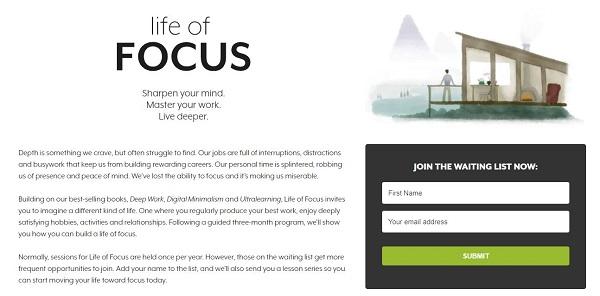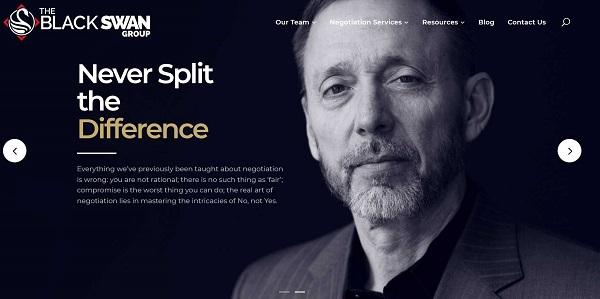Depth is something we crave, but often struggle to find. Our jobs are full of interruptions, distractions and busywork that keep us from building rewarding careers. Our personal time is splintered, robbing us of presence and peace of mind. We’ve lost the ability to focus and it’s making us miserable.
Building on our best-selling books, Deep Work, Digital Minimalism and Ultralearning, Life of Focus invites you to imagine a different kind of life. One where you regularly produce your best work, enjoy deeply satisfying hobbies, activities and relationships. Following a guided three-month program, we’ll show you how you can build a life of focus.
Normally, sessions for Life of Focus are held once per year. However, those on the waiting list get more frequent opportunities to join. Add your name to the list, and we’ll also send you a lesson series so you can start moving your life toward focus today.
Sidestep busyness and produce work that matters.The ability to focus has become valuable just as it’s become scarce. Become one of the few who can work deeply, and you’ll feel like you’ve been granted a superpower.
Spend more time on things you really care about.Outside the office, screens beckon: grabbing your attention and numbing you with distraction and emotional manipulation. Fill your time with meaningful activity that will strengthen your spirit rather than diminish it.
Yes, you too can be focused.You have the ability. You have the discipline. What you’re missing is a set of proven instructions for how to invest your energy to cultivate a true life of focus.
Do you wake up already exhausted?
You’ve hit the snooze three times already. You gulp down coffee and rush to work. Meetings, messages and interruptions dominate your time. The day is exhausting and frenetic, but somehow, for all this busyness, you feel like you barely got anything important done.
At home, you fleetingly remember your aspirations to exercise more, and read hard books, and dust off your quilting needles or the workshop in your garage, but there’s dinner to be made, laundry to be folded, groceries to buy, and new “urgent” work emails that arrived while you were commuting.
You flail at some of these tasks before eventually giving into the escapism of a screen: Instagram, Netflix, notifications and pings. Some are funny, others outraging, most just numbing. There’s an inner voice, still quiet for now, but asking with insistence: “Am I really happy with this?”
The default setting for modern life is distracted busyness.
It doesn’t have to be this way.
The forces that keep you distracted are powerful:
- Colleagues clutter your inbox because shooting off yet another message is the easiest way to collaborate in the moment.
- Apps are carefully designed to capture your attention.
- Weakened by a steady diet of the superficial, you’ve lost your ability to enjoy deeper alternatives.
You didn’t choose to live this way. Our current condition was an insidious side-effect of otherwise exciting technology: computers, email, social media and smartphones. But just because you didn’t choose this life, doesn’t mean that you can’t choose what comes next. Take back control of your attention and rebuild your capacity for depth.
Choose a life of focus.
Imagine, instead, a life of focus.
You wake up, eager to start the day. You know there will be challenges ahead, but you’re doing the best work of your life—and others have started to take notice.
As you work, you get absorbed into what you’re doing. Emails, meetings and chatter from colleagues leaves your mind as your attention zooms into the task at hand. You feel like an Olympic athlete, performing perfected skills to their peak.
You leave the office satisfied with another day well done. As you get home you’re greeted by the people who matter to you. You share real conversations over dinner—laughter, stories and deep discussions. As the evening goes on, you feel a calm stillness come over you as you turn the page on a new book.
You go to sleep with the pleasant tiredness of a day well done. You know there’s a lot of noise out there in the world, but it isn’t rattling around in your head. You fall asleep easily, knowing whatever challenges tomorrow brings, you’re ready to face them.
A life of focus sounds almost mythical in our modern age. However, with deliberate effort more of your days can be like this one, and less of the frenzied chaos that we mindlessly accept as the status-quo.
Anything you want to achieve is built on a foundation of focus.
Anything worth achieving requires focus. This is true now more than ever.
Research by MIT economist David Autor found that our economy is undergoing skill polarization. Middle class jobs our culture came to rely on are being hollowed out. What’s left are low-skill, low-paying jobs and high-skill, high-paying knowledge work.
Success in knowledge work is not like success on the factory floor. You need creativity. You need to solve problems. You need to quickly master new skills. You need to collaborate with others in a way that makes the most of your collective abilities. You need focus.
Unfortunately, most organizations make focus exceedingly difficult. Instead of making the most of your mind, most companies instead hook everyone up to email or Slack and say: “rock n’ roll!” Work happens in a chaotic flow of messages, meetings and calls. Convenient for the moment, but devastating for the important efforts requiring unbroken concentration. This not only makes us worse at our jobs, but miserable too.
You can be different. You can fight back against the onslaught of interruption, preserve time for depth, and train your mind to make the most of it. You’ll begin to move the needle on things that matter while your peers remain mired in the shallows, and you’ll enjoy your work day more because of it.
Sharpen your mind. Don’t dull it with distractions.
All the great minds of history had one thing in common: they knew how to focus.
- The legendary mathematician Srinivasa Ramanujan would get so absorbed in equations he needed to be fed by hand or else he’d forget to eat.
- Scottish polymath Mary Sommerville became one of the first women to join the Royal Astronomical Society despite the demands of raising five children. How? “I learnt by habit to leave a subject and resume it again at once, like leaving a mark into a book I might be reading.”
- Isaac Newton, as a young man, fled Cambridge University in 1666 to escape the bubonic plague. He brought with him a prized possession: a notebook left to him by his father in a time when paper was still a valuable commodity. Newton used this time to think deeply. As a result, he invented calculus and used it to finally tame our understanding of gravity.
What breakthroughs are beneath the surface of your mind, if only you could dive deep enough to reach them?
In the 21st century, focus has become a forgotten art. We’ve gotten so used to the quick and shallow, we’ve lost the ability to appreciate the patient and deep.
Great thinking requires space. It cannot survive in a fractured mental landscape. A life of focus allows your best ideas and deepest experiences to flourish.
How do you want to be remembered?…that you spent a lot of time glued to your phone?
How much of what you’re spending your time on right now will matter ten years from now? How much of it will you even remember?
We’re hardwired to find meaning in making, mastery and real relationships. This requires intention and focus. Staring at a screen doesn’t fulfill this need. A deep life is deliberate, it won’t arrive by accident.
Time is warped by attention. The moments you’ll remember will be those engaged in meaningful things. Ultimately, it’s not the years of your life, but the life in your years that counts.
Focus is fragile. Our minds weren’t built for modernity.
Your mind didn’t evolve to sustain focus on abstract ideas. Our ancestors relied on maintaining complex social interactions within a tribe, manipulating tools, and planning future behavior. Compared to other animals, this was miraculous, but resisting distractions was decidedly not in our caveman cognitive tool kit.
Then came the Neolithic Revolution. Gathering into permanent settlements, labor specialized, and the value of concentrated thought became more pronounced. Writing required that we repurpose cognitive tools originally evolved for other ends. This is grueling work – as any parent who has tutored their kids to read understands – but it unlocked a vast new potential for thought. From the cognitive calisthenics required to produce the written word came philosophy, mathematics and science–the foundation for our modern society.
This history underscores the fragility of focus. Without training, focus is easily lost. Ancestral instincts will quickly pull us back to a state of distraction and obsession over social status.
This is why the social media giants became some of the most valued companies in the history of the world: exploiting our ancient instincts. It’s why email upended the very nature of work: it too fed on our bias toward distraction and social obligation. It’s why focus is hard–but also why it matters so much.
Without an aggressive plan to reclaim the cognitive abilities that fueled our species’s ascent, you’ll lose them. A life of focus is hard work. But you’re not the first of our kind to put in this effort.
I’ve tried to focus before, but it never seems to stick.
You may have already tried to increase your focus. Cut down on screen time. Push back against unnecessary meetings or messages. Clear your calendar to put in deep work. But, you always find yourself sliding back to your old habits.
Here are three likely explanations for these past struggles:
- You failed to appreciate the forces working against you. Attention economy giants like Facebook and Google spend millions of dollars to figure out how best to snare your attention. Casual declarations to “spend less time on my phone” are doomed to fail.
- You didn’t practice long enough to acquire the skill of focus. Focus is a skill that requires training. If you put aside time for deep efforts without having first done the work to strengthen your cognitive muscles, the experience can be frustrating and ineffective.
- You created a vacuum. A life of focus isn’t just about eliminating distraction. You must then fill this space with high quality and meaningful alternatives. Simply trying to white-knuckle your way to less diversions can be a recipe for boredom at best and existential despair at worse.
A life of focus is a choice. But in order to be decisive, you need more than just willpower—you need a system.
INTRODUCING Life Of Focus
Three months of guided practice.
Three actionable lessons per week.
Achieve focus in your work, life and mind.
Cultivating focus is challenging. It requires overcoming the default settings of modern life to develop something deeper.
We designed Life of Focus to help you achieve this goal. The program has a simple design:
- Each month you’ll train one dimension of focus. The training focuses each month on a clear and effective challenge; the completion of which will cement a new commitment to concentration into your routine. By the end of each month, you’ll enjoy immediate and concrete improvements.
Every week we’ll send three new lessons. These lessons will support your practice, allow you to understand how to make the right efforts and help you navigate around obstacles. Concise and straightforward, they can easily fit into an evening or morning routine, shifting your focus back onto what matters. - All lessons are available as video, audio and text transcripts. This will allow you to adapt the course to your preferences and routine. Watch them over your morning coffee, listen during your evening commute or read them as you plan your day. Once released, you can also go back to them again any time you need a refresher.
Joining, you’re not just getting access to ideas–but an entire community of support. We’ve created a resource page with tons of FAQs, updated regularly. Each lesson allows you to discuss with other students and course instructors. Know that, no matter what challenges you face, you’ll face them alongside hundreds of other students all committed to building a life of focus together.
M.1 Month One: FOCUSED WORK
Deep work is simple to explain, but difficult to consistently achieve. We’ve all had bursts where we’ve gotten days of work done in mere hours. But these flickers of focus are continuously being snuffed out.
Throughout this month, you’ll identify your ideal deep-to-shallow work ratio. We’ll show you how to integrate it into your actual working environment, and show the subtle tricks needed to hit your target consistently.
This month will allow you to make significant progress on the work that matters, replace busyness with accomplishment and create the satisfaction that comes from doing your best.
Lessons from this month include:
- Unraveling the science of attention
- Why workflows, not habits, are the key to deep productivity
- How to negotiate the space for deep work with your boss, coworkers and family
- Mental hacks to increase your capacity for pushing through frustrations
- How to find energy for deep work
- and more…
In addition to the three weekly lessons, we’ve also included an interactive worksheet. This exercise, guided with video instruction, will show you exactly what to do to become a master of deep work.
M.2 Month Two: FOCUSED LIFE
In this month you’ll perform a digital declutter, temporarily stepping away from the distractions clawing at your attention in your life outside of work. During this period, we’ll guide you through a process of rediscovering what matters to you. When the month concludes, you’ll rebuild your digital life with intention, based on these values.
A life of focus isn’t just getting more work done–it’s a fundamental realignment of your attention back onto what matters. Real connection with people you care about. Deep experiences that you’ll remember for a lifetime.
Reclaiming your attention from the world of digital distractions is a not a casual undertaking. As the month progresses, we’ll walk you through hard-won strategies and ideas for succeeding with this ambitious endeavor:
Lessons from this month include:
- The Phone Foyer method and other hacks for reclaiming attention
- How to increase the quality of your time off
- Why real human connection requires effort
- A strategy to shift your time from consumption to creativity
- Why the pull to relax often leaves you feeling more tired than before
- and more…
We have also created an interactive worksheet to guide you through making these important changes. These in-depth exercises, with detailed video instruction, can help you make subtle changes that will allow you to live a more focused life.
M.3 Month Three: FOCUSED MIND
The first two months make focus a regular part of your work and personal life. This last month will teach you how to get more out of these concentrated hours than you ever might have thought was possible.
Keep your mind sharp and you can cut through any obstacle. Cultivating focus is hard work, but it’s easier if you take the right approach.
Like any serious training, getting your mind into shape isn’t an obvious endeavor. We’ll provide you exactly the ideas you need to succeed.
- How to build a cognitive “gym routine” for your mind
- Advice for cultivating motivation
- Cognitive scaffolding, and how you can use it to extend your focus
- How to use boredom to your advantage
- The biggest mistake people make when trying to learn something new
- and more…
In the interactive worksheet for this month, we’ll guide you through how to take your reclaimed time and apply it towards a meaningful project. These exercises, guided with video instruction, will help you avoid making common mistakes that prevent you from achieving your goals.




